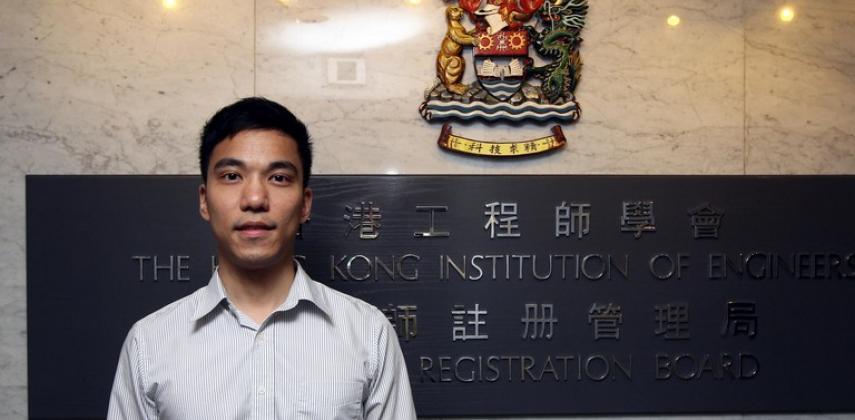As a child, Timothy Chan, was always keen to learn how buildings, bridges, tunnels and other infrastructure are built.
“I think that is how my passion for engineering began,” says Chan, now an engineer at Mott MacDonald Hong Kong. “Pursuing a bachelor’s degree of applied science in civil engineering was an obvious choice. I studied at Canada’s University of British Columbia. I decided to return home because I learned Hong Kong was developing mega-infrastructure projects and thought it would be a golden opportunity to kick-start my civil engineering career.”
Chan felt lucky in joining a multidisciplinary engineering consultant firm to learn about different areas of civil engineering, such as drainage and noise barrier design, tunnel inspection, site supervision and contract administration. He now specialises in building bridges and is currently working as a contractor’s designer in the viaduct design team for the Hong Kong-Macao-Zhuhai Bridge.
“I usually start my day by organising my to-do list. Like in other professions, multitasking and tight schedules are routine. By listing and prioritising tasks, I can work much more efficiently and ensure that all deadlines can be met. Engineering is not only about solving technical problems but also being able to effectively present solutions to the clients in a timely manner,” he says.
Chan’s daily tasks include analysing and validating computer models for the viaduct design, solving design problems and presenting solutions, co-ordinating with other engineering disciplines, and meeting and liaising with clients.
Chan stresses the importance of communication and teamwork.
“Effective communication plays a critical role in engineering. Engineers work as a team and need to present their ideas to different parties including the public, which requires us to translate technical terms into simple language. Nowadays, public engagement is a key element in all engineering projects,” he says.
Chan obtained his professional status as a qualified engineer recently and is now planning to pursue a master’s degree to deepen his knowledge of advanced structural design and project management.
“I believe that I need a strong and sound technical foundation in order to be competent in the profession. As Steve Jobs once said: ‘Stay hungry. Stay foolish.’ The learning process never stops after your graduation, but instead it is a whole new chapter for you to learn,” Chan says.
“The field of engineering is just so broad and, literally, there is something new to learn every day. This is also one of the most interesting aspects about engineering – that you will never get bored as you will have new and different challenges throughout your career,” he says.
Career Advice
Archive
Select article category
Select article category
Career Advice Home
Personal Development and Career path
- Career Doctor
- Career Guidance and Counselling
- English for professional use
- How to Get Promoted
- Job seek in HK
- Plan and start the career path
- Tips to be more productive
- 職場英語 專家教路
How to successed in industry
- Banking and Finance
- Education and Training
- Government and NGO
- Property and Construction
- Startup
Industry Stories, recruitment tips and case study
- Featured stories and job trends
- Legal Case studies for employers
- Recruitment tips
- Successful entrepreneurs’ story
- Successful High flyers’ story
- 職業特搜
Job Market Report, fair and events
- Job fairs and Events
- Job Market Report
- Job Market Trend Report
Select article category
-
Select article category
- Career Doctor
- Career Guidance and Counselling
- English for professional use
- How to Get Promoted
- Job seek in HK
- Plan and start the career path
- Tips to be more productive
- 職場英語 專家教路
Career Advice Home
Personal Development and Career path
- Banking and Finance
- Education and Training
- Government and NGO
- Property and Construction
- Startup
How to successed in industry
- Featured stories and job trends
- Legal Case studies for employers
- Recruitment tips
- Successful entrepreneurs’ story
- Successful High flyers’ story
- 職業特搜
Industry Stories, recruitment tips and case study
- Job fairs and Events
- Job Market Report
- Job Market Trend Report
Job Market Report, fair and events
Boyhood craze sparks career

Other Related Articles
Recommended jobs for you
- Job Posting Enquiry
- + 852 3619 9601 (M-F, 9am - 6pm)
- advertise@cpjobs.com
- General Enquiry
- + 852 3619 9600 (M-F, 9am - 6pm)
- info@cpjobs.com
- Partner with: Classified Post
- + 852 2565 8822 (M-F, 9am - 6pm)
- classified@scmp.com
Copyright © 2025. CPJobs International Limited. All rights reserved

